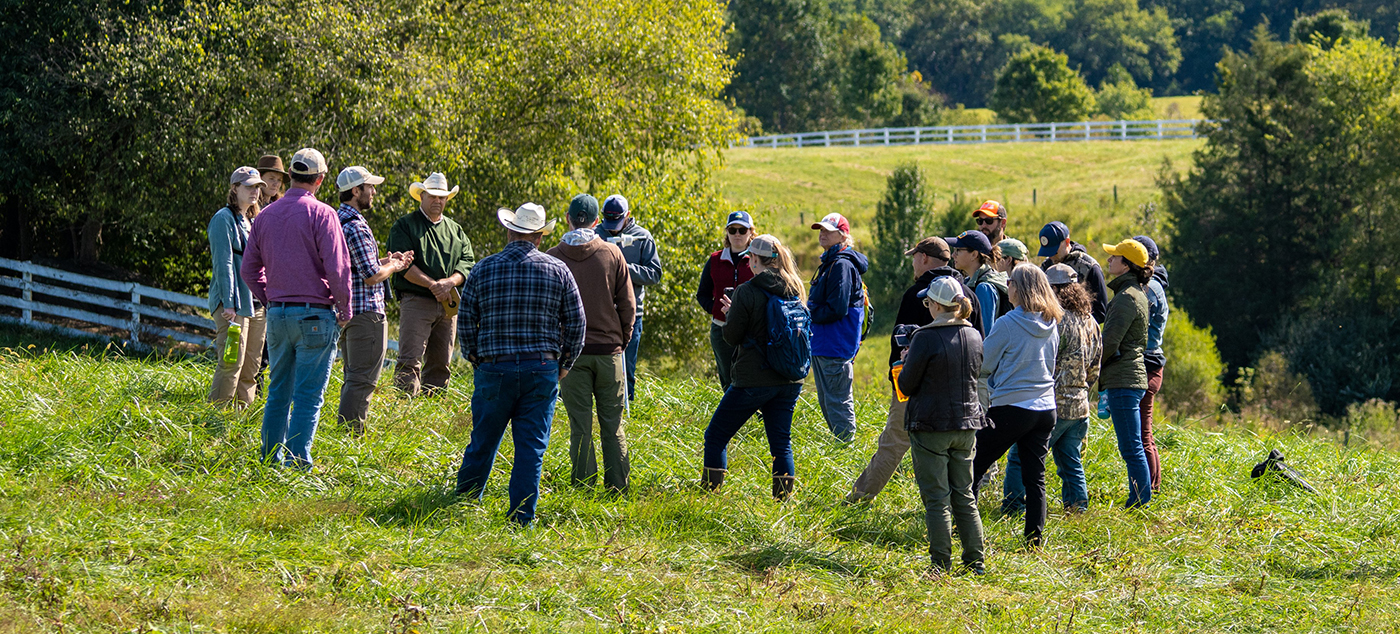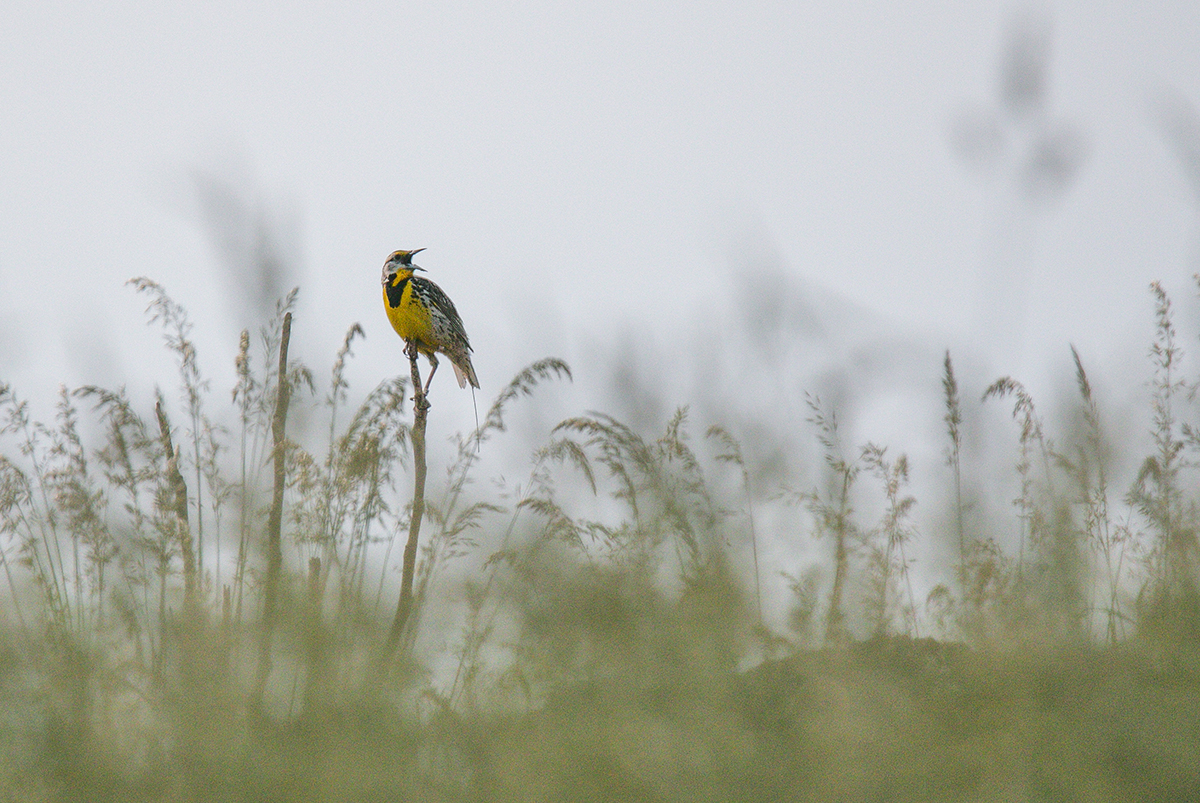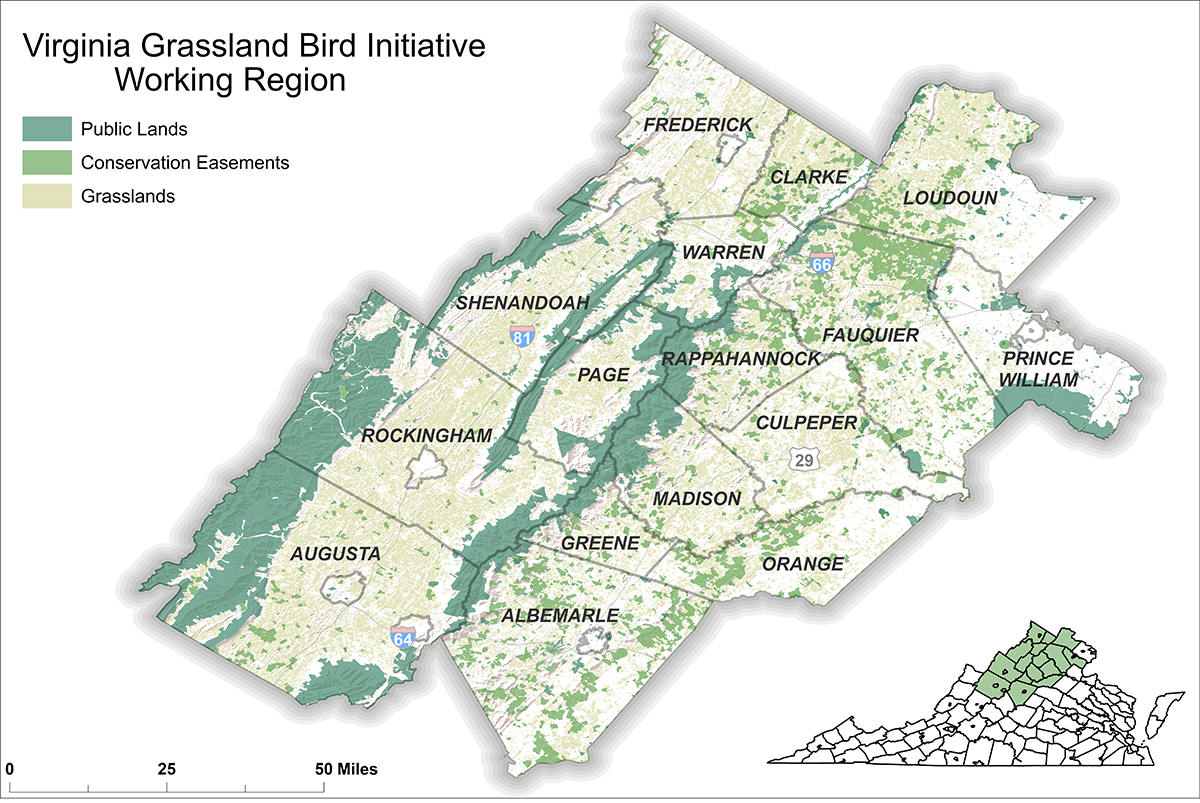
WARRENTON, Va. (Sept. 28, 2023) – Now through Nov. 15, the Virginia Grassland Bird Initiative (VGBI) is accepting applications from producers in 16 counties across the northern Virginia Piedmont, Blue Ridge, and Shenandoah Valley, who are interested in financial incentives for protecting nesting grassland birds during the 2024 haying season.
Entering its third year and funded by National Fish and Wildlife Foundation and the Sarah K. de Coizart Perpetual Charitable Trust, VGBI provides up to $35 per acre in exchange for: 1) delaying the first cut of hay until July 1 or later; and/or 2) rotating livestock out of select fields between April 15 and July 1 or later. Because most grassland bird species require wide expanses of grasses for nesting, the program requires a minimum 20-acre commitment, ideally a large, contiguous patch of grassland distant from thick forest edges and human development. To learn more about the program and to apply, visit: vagrasslandbirds.org/incentives.
Native grasslands have suffered more intense impact by humans than any other North American terrestrial ecosystem. In response, remaining grassland birds have adopted hayfields and pasturelands as surrogate habitat. Grassland bird conservation, therefore, falls largely on private landowners and farmers. By working with producers to implement a suite of best management practices, VGBI strives to stem the tide of grassland bird decline, improve the resiliency of working landscapes, and positively impact the livelihoods that depend upon those lands. In addition to protecting nesting habitat, these practices can also be used strategically to stockpile forage for late summer grazing, to rest and re-seed fields, and to reduce feed expenses.
“Delaying the first hay cutting until at least early July is a game-changer for our grassland birds because it allows the bulk of them to fledge at least one successful clutch of young. That quickly changes a hayfield from being a site of population loss to one of population gain,” said October Greenfield, VGBI co-coordinator and wildlife habitat coordinator at The Piedmont Environmental Council. Meanwhile, rotating livestock out of select fields in the early spring and allowing those fields to rest until early summer — a practice called summer pasture stockpiling — is proving to be beneficial for not only nesting birds, but also cattle, soil health, and producer profitability.

Harlequin Farm in Loudoun County was the program’s first participating horse farm. Owner Paula Bliss trains and coaches people and horses for competitive carriage driving at the farm. “I’ve seen a really positive impact being able to rotate the horses off some of my fields, let them reseed naturally. I’ve seen an increase in the bird populations and beneficial insects, so it has all been a benefit for me. My business can still function, I can still do everything that I do here and still be part of the program.”
“With the majority of remaining grasslands in Virginia currently held in private hands and under agricultural use, VGBI gives farmers the opportunity to become partners in conservation by implementing grassland bird-friendly agricultural practices. We work with farmers to create conservation plans that protect grassland birds while simultaneously supporting their production goals,” Greenfield said.
In its first two years, 27 producers formally enrolled 1,500 acres of land in the program. In addition, 13 landowners implemented delayed haying or summer pasture stockpiling on another 1,800 acres voluntarily, without the program’s financial incentives. In 2024, VGBI is able to add 1,500 new acres thanks to increased funding this year. Producers interested in adopting one or both of these practices, with or without the financial incentive, can apply at vagrasslandbirds.org/incentives/ until November 15.
Tim Mize, of the Virginia Cooperative Extension and a member of VGBI’s steering committee is excited to see this program gaining traction. “Although at times they seem at odds, livestock agriculture and wildlife conservation can benefit one another. It just seems obvious to me that this program is a win/win scenario for both,” he said.

Melinda Alexander at Zinnia Ridge Farm in Culpeper County said she had a “fantastic experience” participating in the delayed hay program last year. “We are grateful to have learned so much and to have been around such knowledgeable and inspiring naturalists while participating in this program.”
The Virginia Grassland Bird Initiative is a partnership of The Piedmont Environmental Council, Smithsonian’s Virginia Working Landscapes, American Farmland Trust, and Quail Forever.
Contact:
October Greenfield, Wildlife Habitat Restoration Coordinator & VGBI Co-Coordinator
The Piedmont Environmental Council
ogreenfield@pecva.org; 540-347-2334, x7051
The Piedmont Environmental Council (PEC) works to protect and restore the lands and waters of the Virginia Piedmont, while building stronger, more sustainable communities. Founded in 1972, PEC is a locally based, community-supported 501(c)3 nonprofit and accredited land trust. At the core of PEC’s approach is a focus on educating, engaging and empowering people to effect positive change in their communities.
Virginia Working Landscapes is a program convened by the Smithsonian’s National Zoo and Conservation Biology Institute (NZCBI) to promote the conservation of native biodiversity and encourage the sustainable use of working landscapes through research, education, and outreach.
American Farmland Trust is the only national organization that takes a holistic approach to agriculture, focusing on the land itself, the agricultural practices used on that land, and the farmers and ranchers who do the work. AFT launched the conservation agriculture movement and continues to raise public awareness through our No Farms, No Food message. Since our founding in 1980, AFT has helped permanently protect over 6.8 million acres of agricultural lands, advanced environmentally-sound farming practices on millions of additional acres and supported thousands of farm families.
Pheasants Forever and Quail Forever make up the nation’s largest nonprofit organization dedicated to upland habitat conservation. This community of more than 400,000 members, supporters and partners is dedicated to the protection of our uplands through habitat improvement, public access, education and advocacy. A network of 754 local chapters spread across North America determine how 100 percent of their locally raised funds are spent — the only national conservation organization that operates through this grassroots structure. Since its creation in 1982, the organization has dedicated more than $1 billion to 567,500 habitat projects benefiting 22 million acres.
